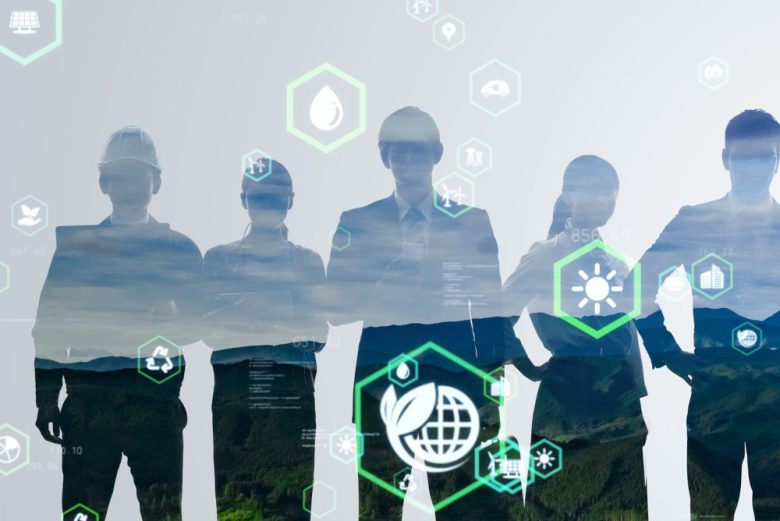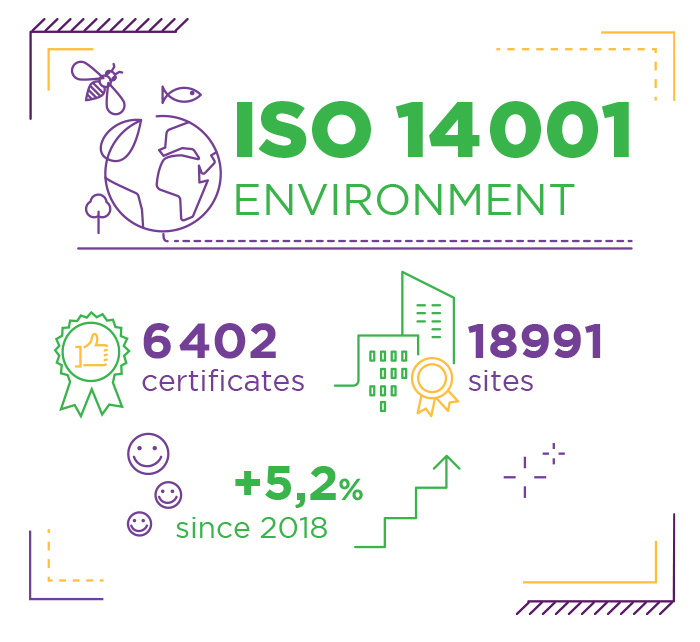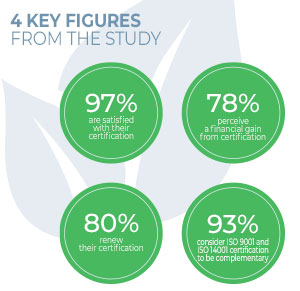Happy birthday ISO 14001!

Launched in 1996, the voluntary ISO 14001 standard has become a worldwide benchmark for building and monitoring an environmental management system (EMS). Twenty-five years on, are we ready to revise this standard, which has led to the certification of 19,000 sites in France? Answer in 2022.
August 2021: the Climate and Resilience Act becomes part of French environmental legislation. We’ve come a long way since the 1990s, when environmental awareness first emerged in society! The destruction of the ozone layer, the Kyoto Protocol, ecological scandals… At the time, the subject was not yet making the headlines, but economic players were beginning to think about the need to contribute to the effort and to organize themselves internally to limit their own impacts.
This gave rise to the concept of environmental management systems (EMS), the ecological counterpart of quality management systems (QMS), which already have their own voluntary standard, ISO 9001. ISO began work on EMSs in 1991, with a dedicated committee (ISO/TC 207/SC 1, under British leadership), with the aim of drawing up a guide to help companies and institutions lay the foundations of their environmental policy. Each member country worked on the project, and all approved a final version of the text in 1996: this was the voluntary ISO 14001 standard. Adopted in Europe and France, it is now marketed as NF EN ISO 14001 in the AFNOR collection.
We don’t realize it today, but when the first version of ISO 14001 saw the light of day, the publication had a highly innovative character,” explains Lina Ismail, project manager at AFNOR, who follows the theme of environmental management in conjunction with ISO/TC 207. For the first time, an internationally-recognized benchmark set out the founding principles of sustainable development. By evolving with the times, it has established itself as an indispensable sesame. ” With the times, that is to say, over the course of revisions: 2004, 2015, and perhaps 2022?
ISO 14001, progressive, modern, universal
Twenty-five years on, there is no longer a single economic player, whether a company, a local authority or an institution, who disputes the idea that environmental impact should be taken care of and demonstrated. Externally first, to prove its good practices in the face of competition and show its credentials (or rather its green credentials) in invitations to tender. Indeed, many principals require their suppliers, service providers and subcontractors to hold a certificate attesting that their EMS meets ISO 14001 requirements. Then, internally, to mobilize teams, create momentum around a societal issue, and manage risks.
The evidence is clear, as we pointed out in an article in the spring of 2021: the standard has spread deep into the economy, from the CAC 40 to very small businesses. One of the strengths of ISO 14001 lies in its universal aspect,” confirms Vincent Morisset, Chairman of the French standardization committee covering this standard. Companies of all sizes, in all sectors and in all locations can find their way around. The text enables each company to identify and control its impact on the environment, and then assess the relevance of taking concrete measures, with a view to continuous improvement. “The strong point of the standard is that it enables all environmental issues to be aggregated:CO2, biodiversity, eco-design, energy, waste, resources, etc. “, continues Béatrice Poirier, ISO 14001 Product Manager at AFNOR Certification.
The major revision of the text in 2015 introduced a new principle: in addition to the obligation of means that organizations set themselves by applying the standard (they must therefore equip themselves with a management system), the text directs them towards an obligation of results: they are now encouraged to demonstrate that their environmental performance is improving. ” This paradigm shift has considerably strengthened ISO 14001,” says Vincent Morisset.
A standard that speaks to every level of the organization chart
 The lifecycle approach has breathed new life into the standard, which is spreading to all levels of the organization: management and the quality manager are no longer the only ones concerned! “Managers, especially those in the field, are on the front line in taking concrete action and raising their teams’ awareness of best practices. By placing the environment at the heart of the company’s strategy, ISO 14001 leads to in-depth action” , observes Marie-Hélène Amétrano. In 2019, France had 6,402 active ISO 14001 certificates, 5% more than in 2018 and covering almost 19,000 sites. That year, ISO counted over 312,500 active certificates worldwide, compared with 308,000 a year earlier(source: Iso Survey 2020).
The lifecycle approach has breathed new life into the standard, which is spreading to all levels of the organization: management and the quality manager are no longer the only ones concerned! “Managers, especially those in the field, are on the front line in taking concrete action and raising their teams’ awareness of best practices. By placing the environment at the heart of the company’s strategy, ISO 14001 leads to in-depth action” , observes Marie-Hélène Amétrano. In 2019, France had 6,402 active ISO 14001 certificates, 5% more than in 2018 and covering almost 19,000 sites. That year, ISO counted over 312,500 active certificates worldwide, compared with 308,000 a year earlier(source: Iso Survey 2020).
ISO 14001, the cornerstone of environmental certification
Lina Ismail explains: “While the number of eco-labels is increasing, ISO 14001 remains by far the most significant, as it is based on the most widely applied standard . This certification derives its legitimacy not only from the figures, but also from the benchmarks it sets. ISO 14001 has demystified the idea that an environmental policy is the prerogative of large corporations. On the contrary, the standard shows that any organization can adopt it. Many small and medium-sized businesses are asking us about this.
 According to a March 2018 AFNOR Certification survey, 97% of certified companies are satisfied with ISO 14001. For 90% of them, their image has improved, and 78% even perceive a financial gain. However, there’s no reason to rest on our laurels… In mid-September 2021, the International Organization for Standardization is launching a major consultation with users of the standard, to gain a better understanding of the standard’s uses, strengths and limitations. And see if it needs revising, as in 2004 and 2015. A new revision could enable us to go even further on certain concepts, such as the life cycle,” says Marie-Hélène Amétrano. The management of resources and biodiversity is at least as important as the climate issue, and we need to be even more demanding on these aspects. But we also need to strengthen links with CSR and the circular economy, and emphasize the positive value of the environment, which is too often associated with a punitive approach.
According to a March 2018 AFNOR Certification survey, 97% of certified companies are satisfied with ISO 14001. For 90% of them, their image has improved, and 78% even perceive a financial gain. However, there’s no reason to rest on our laurels… In mid-September 2021, the International Organization for Standardization is launching a major consultation with users of the standard, to gain a better understanding of the standard’s uses, strengths and limitations. And see if it needs revising, as in 2004 and 2015. A new revision could enable us to go even further on certain concepts, such as the life cycle,” says Marie-Hélène Amétrano. The management of resources and biodiversity is at least as important as the climate issue, and we need to be even more demanding on these aspects. But we also need to strengthen links with CSR and the circular economy, and emphasize the positive value of the environment, which is too often associated with a punitive approach.
The results of the study, expected in January 2022, will serve as a starting point for the debates that each ISO member country will conduct to see if a revision is relevant. The French standardization committee will also be launching a reflection on this founding text.